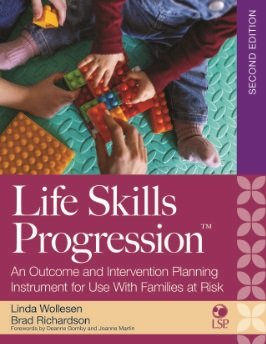
LSP Research & Evaluation
Literature
Health Literacy:
The Life Skills Progression, 2nd Edition, devotes an entire chapter to Health Literacy which refers
to the capacity to access and benefit from health and social services, and to maintain personal
and family health or the capacity to obtain, process and understand basic health information to make health decisions (HRSA). Some of the literacy skills the Institute of Medicine identifies that
an individual needs in order to use the US healthcare system and make health-related decisions
are listed below. Without these skills a mother cannot maintain her health or her children’s health.
Skills needed to use the US Healthcare system:
- Conceptual Knowledge (background knowledge)
Example: The key messages from parent and health education materials. - Speaking
Example: Express concerns and needs to a healthcare provider. Ask for help. - Listening
Example: Understands instructions and acts on them. - Writing
Example: Fill out forms. - Reading
Example: Medication labels, learning background knowledge, problem solving. - Numeracy (using numbers)
Example: Keeps appointments.
| Source | |
| Advancing Excellence in Health Care | AHRG |
| Maternal Health Literacy Progression | Mobley et al. |
| Health Literacy for Health Equity | Natl Academy of Medicine |
| Health Literacy and Depression in Context of Home Visitation | Smith, S., Moore, E.J. |
| PAT Health Literacy Demonstration Project | Carroll, L., Smith, S., Thompson, N. |
| Communicating With Low-Health Literacy | 2020 Gov. Conference on Public Health |
Evaluation:
- American Evaluation Association Guiding Principles for Evaluators
- Consortium for Substance Abuse Research and Evaluation
- Developmental Evaluation BetterEvaluation website
- Agency for Healthcare Research and Quality Elements of an Evaluation Plan
- Annual Report Family Development and Self-Sufficiency Program
- Family Outcome Measures - list of instruments
- Measuring Outcomes of United Way Funded Programs
- National Resource Center for Family Centered Practice
- The Center for Public Health Evaluation and Research
Home Visitation:
Home visiting is a service model and prevention strategy used to support pregnant parenting
moms and families to promote infant and child health, promote development and school
readiness, and prevent child maltreatment. The Life Skills Progression states, To produce
consistent positive outcomes, programs must work continuously to identify and incorporate appropriate best practice methods in their work with young families. There is a direct and logical link between the measurement of outcomes and best practice methods. The California First 5
school readiness report summarizes home visitation research for six nationally recognized programs: Early Head Start (EHS), Healthy Families America, Home Instruction for Parents and Preschool Youngsters (HIPPY), Nurse-Family Partnership (NFP), Parent-Child Home Program
(PCHP), and Parents as Teachers (PAT) identifying social support, case management and
referrals to other community services, and education about parenting and child development
as common characteristics that are effective across programs. For more information on Home Visiting Programs, see the Child Welfare Information Gateway.
- Evidence of Effectiveness [View]
- Program participant [View]

- Replicating Evidence-Based Home Visiting Models [View]
- Evaluating Training and Professional Development for Home-Based Providers [View]
- Implementation and Outcomes of State-Funded Home Visiting Programs in Maryland [View]
- Triadic Interactions in MIECHV: Relations to Home Visit Quality [View]
Family Engagement:
-
- ...
Parent Education:
-
- ...
Social Determinants of Health:
-
- ...
Early Childhood Development:
-
- ...
